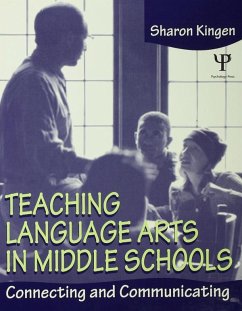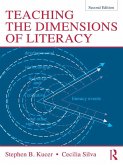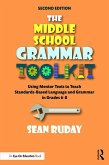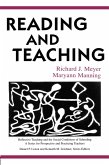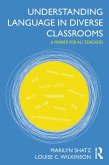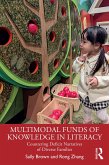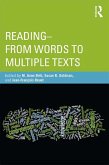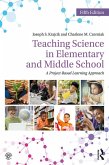103,95 €
103,95 €
inkl. MwSt.
Sofort per Download lieferbar

52 °P sammeln
103,95 €
Als Download kaufen

103,95 €
inkl. MwSt.
Sofort per Download lieferbar

52 °P sammeln
Jetzt verschenken
Alle Infos zum eBook verschenken
103,95 €
inkl. MwSt.
Sofort per Download lieferbar
Alle Infos zum eBook verschenken

52 °P sammeln
- Format: PDF
- Merkliste
- Auf die Merkliste
- Bewerten Bewerten
- Teilen
- Produkt teilen
- Produkterinnerung
- Produkterinnerung

Bitte loggen Sie sich zunächst in Ihr Kundenkonto ein oder registrieren Sie sich bei
bücher.de, um das eBook-Abo tolino select nutzen zu können.
Hier können Sie sich einloggen
Hier können Sie sich einloggen
Sie sind bereits eingeloggt. Klicken Sie auf 2. tolino select Abo, um fortzufahren.

Bitte loggen Sie sich zunächst in Ihr Kundenkonto ein oder registrieren Sie sich bei bücher.de, um das eBook-Abo tolino select nutzen zu können.
Primary text for middle school language arts methods courses. Presents balanced attention to various teaching strategies, processes, and content, demonstrating how all of these connect to improve students abilities to communicate.
- Geräte: PC
- mit Kopierschutz
- eBook Hilfe
- Größe: 99.67MB
Andere Kunden interessierten sich auch für
![Teaching the Dimensions of Literacy (eBook, PDF) Teaching the Dimensions of Literacy (eBook, PDF)]() Stephen KucerTeaching the Dimensions of Literacy (eBook, PDF)72,95 €
Stephen KucerTeaching the Dimensions of Literacy (eBook, PDF)72,95 €![The Middle School Grammar Toolkit (eBook, PDF) The Middle School Grammar Toolkit (eBook, PDF)]() Sean RudayThe Middle School Grammar Toolkit (eBook, PDF)29,95 €
Sean RudayThe Middle School Grammar Toolkit (eBook, PDF)29,95 €![Reading and Teaching (eBook, PDF) Reading and Teaching (eBook, PDF)]() Richard MeyerReading and Teaching (eBook, PDF)20,95 €
Richard MeyerReading and Teaching (eBook, PDF)20,95 €![Understanding Language in Diverse Classrooms (eBook, PDF) Understanding Language in Diverse Classrooms (eBook, PDF)]() Marilyn ShatzUnderstanding Language in Diverse Classrooms (eBook, PDF)44,95 €
Marilyn ShatzUnderstanding Language in Diverse Classrooms (eBook, PDF)44,95 €![Multimodal Funds of Knowledge in Literacy (eBook, PDF) Multimodal Funds of Knowledge in Literacy (eBook, PDF)]() Sally BrownMultimodal Funds of Knowledge in Literacy (eBook, PDF)40,95 €
Sally BrownMultimodal Funds of Knowledge in Literacy (eBook, PDF)40,95 €![Reading - From Words to Multiple Texts (eBook, PDF) Reading - From Words to Multiple Texts (eBook, PDF)]() Reading - From Words to Multiple Texts (eBook, PDF)50,95 €
Reading - From Words to Multiple Texts (eBook, PDF)50,95 €![Teaching Science in Elementary and Middle School (eBook, PDF) Teaching Science in Elementary and Middle School (eBook, PDF)]() Joseph S. KrajcikTeaching Science in Elementary and Middle School (eBook, PDF)87,95 €
Joseph S. KrajcikTeaching Science in Elementary and Middle School (eBook, PDF)87,95 €-
-
-
Primary text for middle school language arts methods courses. Presents balanced attention to various teaching strategies, processes, and content, demonstrating how all of these connect to improve students abilities to communicate.
Dieser Download kann aus rechtlichen Gründen nur mit Rechnungsadresse in A, B, BG, CY, CZ, D, DK, EW, E, FIN, F, GR, HR, H, IRL, I, LT, L, LR, M, NL, PL, P, R, S, SLO, SK ausgeliefert werden.
Produktdetails
- Produktdetails
- Verlag: Taylor & Francis
- Seitenzahl: 624
- Erscheinungstermin: 1. Februar 2000
- Englisch
- ISBN-13: 9781135675875
- Artikelnr.: 41528308
- Verlag: Taylor & Francis
- Seitenzahl: 624
- Erscheinungstermin: 1. Februar 2000
- Englisch
- ISBN-13: 9781135675875
- Artikelnr.: 41528308
- Herstellerkennzeichnung Die Herstellerinformationen sind derzeit nicht verfügbar.
Sharon Kingen
Note to the Reader
Part I Foundations and Principles
Chapter 1 Centering on Students
Overview
Consider These Questions
The Best Starting Point
Developmental Characteristics
Motivation
Special Student Populations
The Gender Issue
Recommended Readings
Chapter 2 Teaching Middle School
Overview
Consider These Questions
Becoming a Middle Level Teacher
The Middle School Philosophy
Middle School Curriculum
Classroom Organization and Management
Discipline at the Middle Level
Teaching Strategies
Tracking, Immersion, and Grouping
Assessment and Evaluation
Deciding Whether Middle School Is for You
Recommended Readings
Chapter 3 Literacy Learning and Teaching
Overview
Consider These Questions
Becoming a Language Arts Teacher
Defining the Language Arts
Literacy Learning From a Natural Perspective
From Natural Learning to Classroom Instruction
Best Practices in Language Arts Instruction
Philosophies of Middle School Language Arts Teachers
Characteristics of Effective Middle School Language Arts Teachers
Some Patterns of Language Arts Practice
Language Arts Teaching Strategies
Planning
Recommended Readings
Part II Teaching the Processes of Language Arts
Chapter 4 Teaching Reading
Overview
Consider These Questions
Rethinking Reading
What Current Research Indicates About Reading
Reading as a Transactional Process of Thought
Effects of Text
and Reader
Based Factors
Implications for the Classroom
Instructional Options
Reading Activities
Structure of Text
Assessing Reading
Recommended Readings
Reading Activities and Suggestions
Chapter 5 Teaching Writing
Overview
Consider These Questions
Composition Instruction
A Look Back?
The Rhetorical Problem
What Research Says About Writing as a Process
The Teacher and the Teaching of Writing
Specifics of Teaching Writing
A Writing Instruction Dilemma
Designing a Composition Curriculum
Student
Selected Writing
A Closer Look at Journals
Ungraded Writing
Mini
Lessons
Writing Portfolios
Rethinking Errors
Response, Assessment, and Evaluation of Writing
A Final Comment
Recommended Readings
Writing Activities and Suggestions
Chapter 6 Teaching Speaking and Performing
Overview
Consider These Questions
About Speaking and Performing
Purposes Oral Language Serves
Some Values of Academic Conversation
Is Talking Enough?
Thinking of Speaking and Performing as a Continuum
The Oral Curriculum
Teaching Speaking
Speaking as Performance
Teaching Drama
Drama as Performance
The Reluctant Speaker
Some Special Values of Teaching Speaking and Performing
Integrating Speaking and Performing
Assessing and Evaluating Speaking and Performing
Final Comments About Speaking and Performing
Recommended Readings
Speaking and Performing Activities and Suggestions
Chapter 7 Teaching Listening
Overview
Consider These Questions
About Listening
Listening Processes
Listening Inhibitors
Listening Purposes
Problems of Purpose Mismatch
Building Listening Skills
Concluding Cautions About Teaching Listening
Assessing and Evaluating Listening
Recommended Readings
Listening Activities and Suggestions
Chapter 8 Teaching Visual Literacy
Overview
Consider These Questions
Introductory Comments
Why Teach Visual Literacy?
What Should Be Taught
Some Possible Problems
Looking Specifically at Viewing
Looking Specifically at Visually Representing
Assessing and Evaluating Visual Literacy
Recommended Readings
Visual Literacy Activities and Suggestions
Part III Teaching the Content of Language Arts Chapter 9 Teaching Literature
Overview
Consider These Questions
Teaching and Learning About Literature
Literary Content at the Middle Level
Literary Criticism in the Middle School Classroom
Current Literary Focus
Teach, Teach About, or Teach Through?
Choosing Literature
Sequencing Literature
Addressing Student Diversity
Literature Discussions
Other Responses to Literature
Genres in the Middle School
Young Adult Literature
Multicultural Literature
Coping with Censorship
Assessing Literary Understanding
Recommended Readings
Teaching Literature Activities and Suggestions
Chapter 10 Teaching Language
Overview
Consider These Questions
One View of Teaching Language
Making Choices About Language Study
Language Principles and Concepts
Linguistic Fields of Study
Linguistics in School
Teaching Grammar and Syntax
Questions of Usage
Teaching Usage
Understanding Mechanics
Teaching Mechanics
What to Do About Spelling
Building Vocabulary
Other Aspects of Language Study
Language Study and Teacher Knowledge
Assessing and Evaluating Language Understanding
Recommended Readings
Teaching Language Activities and Suggestions
Chapter 11 Teaching Media
Overview
Consider These Questions
Must I Teach Media?
Looking Back
Current Status
Developing a Plan for Instruction
Trimming the Idea to Size
Finding a Focus
Some Instructional Possibilities
The Importance of Integrating Media
Assessing and Evaluating Media Understanding
Recommended Readings
Teaching Media Activities and Suggestions
PART IV Connecting Teaching and Learning
Chapter 12 Integrating the Language Arts
Overview
Consider These Questions
Putting the Pieces Together
Integrated Language Arts Units
Thematic Units in Language Arts
Inquiry Learning in Language Arts
Reading
Writing Workshop Approaches
Using Computers in Language Arts
What Do I Do With the Textbooks?
Recommended Readings
Chapter 13 Interdisciplinary and Integrative Teaching
Overview
Consider These Questions
Interdisciplinary and Integrative Teaching: What Are the Options?
Why Do This?
Generating Themes
Developing Units
Community Service Projects
Getting Started and Maintaining Momentum
Practical Issues
Integrating Technology
Assessing and Evaluating Integrated Learning
Recommended Readings
Chapter 13 Interdisciplinary and Integrative Teaching
Overview
Consider These Questions
Interdisciplinary and Integrative Teaching: What Are the Options?
Why Do This?
Generating Themes
Developing Units
Community Service Projects
Getting Started and Maintaining Momentum
Practical Issues
Integrating Technology
Assessing and Evaluating Integrated Learning
Recommended Readings
Chapter 14 Integrating into the Teaching Profession
Overview
Consider These Questions
Becoming a Professional Educator
The Importance of Self
Reflection
Continued Professional Development
Teacher as Researcher
Contributing to the Profession
Working With Administrators, Faculty, and Staff
Developing Positive Relationships With Parents and Other Caregivers
Tests, Assessments, Grading, and Report Cards
Avoiding Undue Stress and Burnout
To Teach Well You Must Also Live Well
Recommended Reading
References
Author Index
Subject Index.
Part I Foundations and Principles
Chapter 1 Centering on Students
Overview
Consider These Questions
The Best Starting Point
Developmental Characteristics
Motivation
Special Student Populations
The Gender Issue
Recommended Readings
Chapter 2 Teaching Middle School
Overview
Consider These Questions
Becoming a Middle Level Teacher
The Middle School Philosophy
Middle School Curriculum
Classroom Organization and Management
Discipline at the Middle Level
Teaching Strategies
Tracking, Immersion, and Grouping
Assessment and Evaluation
Deciding Whether Middle School Is for You
Recommended Readings
Chapter 3 Literacy Learning and Teaching
Overview
Consider These Questions
Becoming a Language Arts Teacher
Defining the Language Arts
Literacy Learning From a Natural Perspective
From Natural Learning to Classroom Instruction
Best Practices in Language Arts Instruction
Philosophies of Middle School Language Arts Teachers
Characteristics of Effective Middle School Language Arts Teachers
Some Patterns of Language Arts Practice
Language Arts Teaching Strategies
Planning
Recommended Readings
Part II Teaching the Processes of Language Arts
Chapter 4 Teaching Reading
Overview
Consider These Questions
Rethinking Reading
What Current Research Indicates About Reading
Reading as a Transactional Process of Thought
Effects of Text
and Reader
Based Factors
Implications for the Classroom
Instructional Options
Reading Activities
Structure of Text
Assessing Reading
Recommended Readings
Reading Activities and Suggestions
Chapter 5 Teaching Writing
Overview
Consider These Questions
Composition Instruction
A Look Back?
The Rhetorical Problem
What Research Says About Writing as a Process
The Teacher and the Teaching of Writing
Specifics of Teaching Writing
A Writing Instruction Dilemma
Designing a Composition Curriculum
Student
Selected Writing
A Closer Look at Journals
Ungraded Writing
Mini
Lessons
Writing Portfolios
Rethinking Errors
Response, Assessment, and Evaluation of Writing
A Final Comment
Recommended Readings
Writing Activities and Suggestions
Chapter 6 Teaching Speaking and Performing
Overview
Consider These Questions
About Speaking and Performing
Purposes Oral Language Serves
Some Values of Academic Conversation
Is Talking Enough?
Thinking of Speaking and Performing as a Continuum
The Oral Curriculum
Teaching Speaking
Speaking as Performance
Teaching Drama
Drama as Performance
The Reluctant Speaker
Some Special Values of Teaching Speaking and Performing
Integrating Speaking and Performing
Assessing and Evaluating Speaking and Performing
Final Comments About Speaking and Performing
Recommended Readings
Speaking and Performing Activities and Suggestions
Chapter 7 Teaching Listening
Overview
Consider These Questions
About Listening
Listening Processes
Listening Inhibitors
Listening Purposes
Problems of Purpose Mismatch
Building Listening Skills
Concluding Cautions About Teaching Listening
Assessing and Evaluating Listening
Recommended Readings
Listening Activities and Suggestions
Chapter 8 Teaching Visual Literacy
Overview
Consider These Questions
Introductory Comments
Why Teach Visual Literacy?
What Should Be Taught
Some Possible Problems
Looking Specifically at Viewing
Looking Specifically at Visually Representing
Assessing and Evaluating Visual Literacy
Recommended Readings
Visual Literacy Activities and Suggestions
Part III Teaching the Content of Language Arts Chapter 9 Teaching Literature
Overview
Consider These Questions
Teaching and Learning About Literature
Literary Content at the Middle Level
Literary Criticism in the Middle School Classroom
Current Literary Focus
Teach, Teach About, or Teach Through?
Choosing Literature
Sequencing Literature
Addressing Student Diversity
Literature Discussions
Other Responses to Literature
Genres in the Middle School
Young Adult Literature
Multicultural Literature
Coping with Censorship
Assessing Literary Understanding
Recommended Readings
Teaching Literature Activities and Suggestions
Chapter 10 Teaching Language
Overview
Consider These Questions
One View of Teaching Language
Making Choices About Language Study
Language Principles and Concepts
Linguistic Fields of Study
Linguistics in School
Teaching Grammar and Syntax
Questions of Usage
Teaching Usage
Understanding Mechanics
Teaching Mechanics
What to Do About Spelling
Building Vocabulary
Other Aspects of Language Study
Language Study and Teacher Knowledge
Assessing and Evaluating Language Understanding
Recommended Readings
Teaching Language Activities and Suggestions
Chapter 11 Teaching Media
Overview
Consider These Questions
Must I Teach Media?
Looking Back
Current Status
Developing a Plan for Instruction
Trimming the Idea to Size
Finding a Focus
Some Instructional Possibilities
The Importance of Integrating Media
Assessing and Evaluating Media Understanding
Recommended Readings
Teaching Media Activities and Suggestions
PART IV Connecting Teaching and Learning
Chapter 12 Integrating the Language Arts
Overview
Consider These Questions
Putting the Pieces Together
Integrated Language Arts Units
Thematic Units in Language Arts
Inquiry Learning in Language Arts
Reading
Writing Workshop Approaches
Using Computers in Language Arts
What Do I Do With the Textbooks?
Recommended Readings
Chapter 13 Interdisciplinary and Integrative Teaching
Overview
Consider These Questions
Interdisciplinary and Integrative Teaching: What Are the Options?
Why Do This?
Generating Themes
Developing Units
Community Service Projects
Getting Started and Maintaining Momentum
Practical Issues
Integrating Technology
Assessing and Evaluating Integrated Learning
Recommended Readings
Chapter 13 Interdisciplinary and Integrative Teaching
Overview
Consider These Questions
Interdisciplinary and Integrative Teaching: What Are the Options?
Why Do This?
Generating Themes
Developing Units
Community Service Projects
Getting Started and Maintaining Momentum
Practical Issues
Integrating Technology
Assessing and Evaluating Integrated Learning
Recommended Readings
Chapter 14 Integrating into the Teaching Profession
Overview
Consider These Questions
Becoming a Professional Educator
The Importance of Self
Reflection
Continued Professional Development
Teacher as Researcher
Contributing to the Profession
Working With Administrators, Faculty, and Staff
Developing Positive Relationships With Parents and Other Caregivers
Tests, Assessments, Grading, and Report Cards
Avoiding Undue Stress and Burnout
To Teach Well You Must Also Live Well
Recommended Reading
References
Author Index
Subject Index.
Note to the Reader
Part I Foundations and Principles
Chapter 1 Centering on Students
Overview
Consider These Questions
The Best Starting Point
Developmental Characteristics
Motivation
Special Student Populations
The Gender Issue
Recommended Readings
Chapter 2 Teaching Middle School
Overview
Consider These Questions
Becoming a Middle Level Teacher
The Middle School Philosophy
Middle School Curriculum
Classroom Organization and Management
Discipline at the Middle Level
Teaching Strategies
Tracking, Immersion, and Grouping
Assessment and Evaluation
Deciding Whether Middle School Is for You
Recommended Readings
Chapter 3 Literacy Learning and Teaching
Overview
Consider These Questions
Becoming a Language Arts Teacher
Defining the Language Arts
Literacy Learning From a Natural Perspective
From Natural Learning to Classroom Instruction
Best Practices in Language Arts Instruction
Philosophies of Middle School Language Arts Teachers
Characteristics of Effective Middle School Language Arts Teachers
Some Patterns of Language Arts Practice
Language Arts Teaching Strategies
Planning
Recommended Readings
Part II Teaching the Processes of Language Arts
Chapter 4 Teaching Reading
Overview
Consider These Questions
Rethinking Reading
What Current Research Indicates About Reading
Reading as a Transactional Process of Thought
Effects of Text
and Reader
Based Factors
Implications for the Classroom
Instructional Options
Reading Activities
Structure of Text
Assessing Reading
Recommended Readings
Reading Activities and Suggestions
Chapter 5 Teaching Writing
Overview
Consider These Questions
Composition Instruction
A Look Back?
The Rhetorical Problem
What Research Says About Writing as a Process
The Teacher and the Teaching of Writing
Specifics of Teaching Writing
A Writing Instruction Dilemma
Designing a Composition Curriculum
Student
Selected Writing
A Closer Look at Journals
Ungraded Writing
Mini
Lessons
Writing Portfolios
Rethinking Errors
Response, Assessment, and Evaluation of Writing
A Final Comment
Recommended Readings
Writing Activities and Suggestions
Chapter 6 Teaching Speaking and Performing
Overview
Consider These Questions
About Speaking and Performing
Purposes Oral Language Serves
Some Values of Academic Conversation
Is Talking Enough?
Thinking of Speaking and Performing as a Continuum
The Oral Curriculum
Teaching Speaking
Speaking as Performance
Teaching Drama
Drama as Performance
The Reluctant Speaker
Some Special Values of Teaching Speaking and Performing
Integrating Speaking and Performing
Assessing and Evaluating Speaking and Performing
Final Comments About Speaking and Performing
Recommended Readings
Speaking and Performing Activities and Suggestions
Chapter 7 Teaching Listening
Overview
Consider These Questions
About Listening
Listening Processes
Listening Inhibitors
Listening Purposes
Problems of Purpose Mismatch
Building Listening Skills
Concluding Cautions About Teaching Listening
Assessing and Evaluating Listening
Recommended Readings
Listening Activities and Suggestions
Chapter 8 Teaching Visual Literacy
Overview
Consider These Questions
Introductory Comments
Why Teach Visual Literacy?
What Should Be Taught
Some Possible Problems
Looking Specifically at Viewing
Looking Specifically at Visually Representing
Assessing and Evaluating Visual Literacy
Recommended Readings
Visual Literacy Activities and Suggestions
Part III Teaching the Content of Language Arts Chapter 9 Teaching Literature
Overview
Consider These Questions
Teaching and Learning About Literature
Literary Content at the Middle Level
Literary Criticism in the Middle School Classroom
Current Literary Focus
Teach, Teach About, or Teach Through?
Choosing Literature
Sequencing Literature
Addressing Student Diversity
Literature Discussions
Other Responses to Literature
Genres in the Middle School
Young Adult Literature
Multicultural Literature
Coping with Censorship
Assessing Literary Understanding
Recommended Readings
Teaching Literature Activities and Suggestions
Chapter 10 Teaching Language
Overview
Consider These Questions
One View of Teaching Language
Making Choices About Language Study
Language Principles and Concepts
Linguistic Fields of Study
Linguistics in School
Teaching Grammar and Syntax
Questions of Usage
Teaching Usage
Understanding Mechanics
Teaching Mechanics
What to Do About Spelling
Building Vocabulary
Other Aspects of Language Study
Language Study and Teacher Knowledge
Assessing and Evaluating Language Understanding
Recommended Readings
Teaching Language Activities and Suggestions
Chapter 11 Teaching Media
Overview
Consider These Questions
Must I Teach Media?
Looking Back
Current Status
Developing a Plan for Instruction
Trimming the Idea to Size
Finding a Focus
Some Instructional Possibilities
The Importance of Integrating Media
Assessing and Evaluating Media Understanding
Recommended Readings
Teaching Media Activities and Suggestions
PART IV Connecting Teaching and Learning
Chapter 12 Integrating the Language Arts
Overview
Consider These Questions
Putting the Pieces Together
Integrated Language Arts Units
Thematic Units in Language Arts
Inquiry Learning in Language Arts
Reading
Writing Workshop Approaches
Using Computers in Language Arts
What Do I Do With the Textbooks?
Recommended Readings
Chapter 13 Interdisciplinary and Integrative Teaching
Overview
Consider These Questions
Interdisciplinary and Integrative Teaching: What Are the Options?
Why Do This?
Generating Themes
Developing Units
Community Service Projects
Getting Started and Maintaining Momentum
Practical Issues
Integrating Technology
Assessing and Evaluating Integrated Learning
Recommended Readings
Chapter 13 Interdisciplinary and Integrative Teaching
Overview
Consider These Questions
Interdisciplinary and Integrative Teaching: What Are the Options?
Why Do This?
Generating Themes
Developing Units
Community Service Projects
Getting Started and Maintaining Momentum
Practical Issues
Integrating Technology
Assessing and Evaluating Integrated Learning
Recommended Readings
Chapter 14 Integrating into the Teaching Profession
Overview
Consider These Questions
Becoming a Professional Educator
The Importance of Self
Reflection
Continued Professional Development
Teacher as Researcher
Contributing to the Profession
Working With Administrators, Faculty, and Staff
Developing Positive Relationships With Parents and Other Caregivers
Tests, Assessments, Grading, and Report Cards
Avoiding Undue Stress and Burnout
To Teach Well You Must Also Live Well
Recommended Reading
References
Author Index
Subject Index.
Part I Foundations and Principles
Chapter 1 Centering on Students
Overview
Consider These Questions
The Best Starting Point
Developmental Characteristics
Motivation
Special Student Populations
The Gender Issue
Recommended Readings
Chapter 2 Teaching Middle School
Overview
Consider These Questions
Becoming a Middle Level Teacher
The Middle School Philosophy
Middle School Curriculum
Classroom Organization and Management
Discipline at the Middle Level
Teaching Strategies
Tracking, Immersion, and Grouping
Assessment and Evaluation
Deciding Whether Middle School Is for You
Recommended Readings
Chapter 3 Literacy Learning and Teaching
Overview
Consider These Questions
Becoming a Language Arts Teacher
Defining the Language Arts
Literacy Learning From a Natural Perspective
From Natural Learning to Classroom Instruction
Best Practices in Language Arts Instruction
Philosophies of Middle School Language Arts Teachers
Characteristics of Effective Middle School Language Arts Teachers
Some Patterns of Language Arts Practice
Language Arts Teaching Strategies
Planning
Recommended Readings
Part II Teaching the Processes of Language Arts
Chapter 4 Teaching Reading
Overview
Consider These Questions
Rethinking Reading
What Current Research Indicates About Reading
Reading as a Transactional Process of Thought
Effects of Text
and Reader
Based Factors
Implications for the Classroom
Instructional Options
Reading Activities
Structure of Text
Assessing Reading
Recommended Readings
Reading Activities and Suggestions
Chapter 5 Teaching Writing
Overview
Consider These Questions
Composition Instruction
A Look Back?
The Rhetorical Problem
What Research Says About Writing as a Process
The Teacher and the Teaching of Writing
Specifics of Teaching Writing
A Writing Instruction Dilemma
Designing a Composition Curriculum
Student
Selected Writing
A Closer Look at Journals
Ungraded Writing
Mini
Lessons
Writing Portfolios
Rethinking Errors
Response, Assessment, and Evaluation of Writing
A Final Comment
Recommended Readings
Writing Activities and Suggestions
Chapter 6 Teaching Speaking and Performing
Overview
Consider These Questions
About Speaking and Performing
Purposes Oral Language Serves
Some Values of Academic Conversation
Is Talking Enough?
Thinking of Speaking and Performing as a Continuum
The Oral Curriculum
Teaching Speaking
Speaking as Performance
Teaching Drama
Drama as Performance
The Reluctant Speaker
Some Special Values of Teaching Speaking and Performing
Integrating Speaking and Performing
Assessing and Evaluating Speaking and Performing
Final Comments About Speaking and Performing
Recommended Readings
Speaking and Performing Activities and Suggestions
Chapter 7 Teaching Listening
Overview
Consider These Questions
About Listening
Listening Processes
Listening Inhibitors
Listening Purposes
Problems of Purpose Mismatch
Building Listening Skills
Concluding Cautions About Teaching Listening
Assessing and Evaluating Listening
Recommended Readings
Listening Activities and Suggestions
Chapter 8 Teaching Visual Literacy
Overview
Consider These Questions
Introductory Comments
Why Teach Visual Literacy?
What Should Be Taught
Some Possible Problems
Looking Specifically at Viewing
Looking Specifically at Visually Representing
Assessing and Evaluating Visual Literacy
Recommended Readings
Visual Literacy Activities and Suggestions
Part III Teaching the Content of Language Arts Chapter 9 Teaching Literature
Overview
Consider These Questions
Teaching and Learning About Literature
Literary Content at the Middle Level
Literary Criticism in the Middle School Classroom
Current Literary Focus
Teach, Teach About, or Teach Through?
Choosing Literature
Sequencing Literature
Addressing Student Diversity
Literature Discussions
Other Responses to Literature
Genres in the Middle School
Young Adult Literature
Multicultural Literature
Coping with Censorship
Assessing Literary Understanding
Recommended Readings
Teaching Literature Activities and Suggestions
Chapter 10 Teaching Language
Overview
Consider These Questions
One View of Teaching Language
Making Choices About Language Study
Language Principles and Concepts
Linguistic Fields of Study
Linguistics in School
Teaching Grammar and Syntax
Questions of Usage
Teaching Usage
Understanding Mechanics
Teaching Mechanics
What to Do About Spelling
Building Vocabulary
Other Aspects of Language Study
Language Study and Teacher Knowledge
Assessing and Evaluating Language Understanding
Recommended Readings
Teaching Language Activities and Suggestions
Chapter 11 Teaching Media
Overview
Consider These Questions
Must I Teach Media?
Looking Back
Current Status
Developing a Plan for Instruction
Trimming the Idea to Size
Finding a Focus
Some Instructional Possibilities
The Importance of Integrating Media
Assessing and Evaluating Media Understanding
Recommended Readings
Teaching Media Activities and Suggestions
PART IV Connecting Teaching and Learning
Chapter 12 Integrating the Language Arts
Overview
Consider These Questions
Putting the Pieces Together
Integrated Language Arts Units
Thematic Units in Language Arts
Inquiry Learning in Language Arts
Reading
Writing Workshop Approaches
Using Computers in Language Arts
What Do I Do With the Textbooks?
Recommended Readings
Chapter 13 Interdisciplinary and Integrative Teaching
Overview
Consider These Questions
Interdisciplinary and Integrative Teaching: What Are the Options?
Why Do This?
Generating Themes
Developing Units
Community Service Projects
Getting Started and Maintaining Momentum
Practical Issues
Integrating Technology
Assessing and Evaluating Integrated Learning
Recommended Readings
Chapter 13 Interdisciplinary and Integrative Teaching
Overview
Consider These Questions
Interdisciplinary and Integrative Teaching: What Are the Options?
Why Do This?
Generating Themes
Developing Units
Community Service Projects
Getting Started and Maintaining Momentum
Practical Issues
Integrating Technology
Assessing and Evaluating Integrated Learning
Recommended Readings
Chapter 14 Integrating into the Teaching Profession
Overview
Consider These Questions
Becoming a Professional Educator
The Importance of Self
Reflection
Continued Professional Development
Teacher as Researcher
Contributing to the Profession
Working With Administrators, Faculty, and Staff
Developing Positive Relationships With Parents and Other Caregivers
Tests, Assessments, Grading, and Report Cards
Avoiding Undue Stress and Burnout
To Teach Well You Must Also Live Well
Recommended Reading
References
Author Index
Subject Index.
